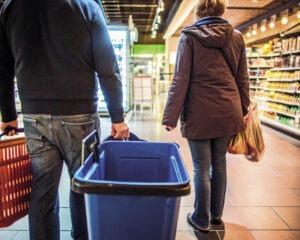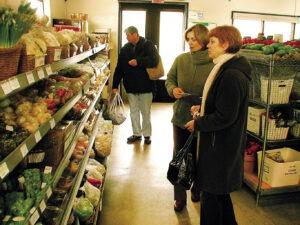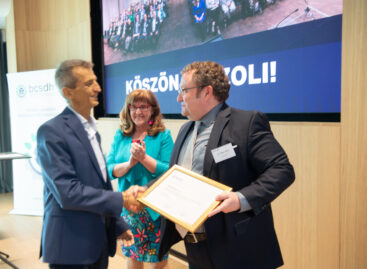Shared goal, different paths
In our article five organisations share their experiences in putting sustainability into practice.
This article is available for reading in Trade magazin 2025/8-9.
The Hungarian Food Bank Association has successfully implemented several high-impact programmes in recent years. These include the ready-made meal rescue program, which was launched in 2023, in collaboration with the National Food Chain Safety Office (Nébih). Food Bank also regularly organises the Spring Collection. In May 2024 244 tonnes of food donations were collected in 410 stores. Another long-standing and successful project is the supermarket rescue, which collects vegetables, fruit and baked goods from 770 stores every day and distributes them to local people in need with the help of 550 partner organisations.

András Nagygyörgy
director of external
relations
Hungarian Food Bank
Association
“In 2024, our activities were extended to non-food products. As part of this, we also deliver office furniture, laptops, hygiene products and other non-food items to people in need. We would like to establish closer ties with agricultural stakeholders”,
explains director of external relations András Nagygyörgy.

Manufacturers, retailers and also consumers are increasingly aware of what should be done to reduce environmental impact, yet this awareness is not fully reflected in everyday practice
Branded Goods Association Hungary: sustainability and competitiveness
Leading FMCG brands have great responsibility when it comes to sustainability, but they still have a lot of work to do, too. Although manufacturers, retailers and consumers are increasingly aware of the practices that should be followed to curb environmental impact, this isn’t yet fully reflected in everyday practice.

Zoltán Fekete
secretary general
Magyar Márkaszövetség
“Sustainability innovations don’t necessarily come from big brands. More and more smaller brands and start-ups are coming up with pioneering solutions that are later adopted by larger companies. At BGA Hungary we lobby to ensure that sustainability regulations aren’t only effective, but they don’t undermine the competitiveness of our member companies either. One of the biggest challenges facing players on the FMCG market today is how to operate sustainably amid economic difficulties and an increasingly expensive regulatory environment”,
says Zoltán Fekete, secretary general of the association.
FÉSZ: a difficult shift in mindset
The Federation of Responsible Food Manufacturers (FÉSZ) supports its members in getting up-to-date information on sustainability regulations and developments. Workshops have been organised to emphasise that sustainability isn’t a standard legal compliance requirement: it requires a mindset change. FÉSZ’s experience is that the domestic food industry isn’t yet in a good position in terms of sustainability. It is particularly difficult for smaller manufacturers to incorporate it into their daily operations.

Attila Vörös
managing director
FÉSZ
“Domestic food manufacturers are in a difficult position: input costs – energy, water, etc. – are much higher than in neighbouring countries. On top of that, they are burdened by extra costs such as the public health product tax (NETA) and the EPR fee”,
points out managing director Attila Vörös.
The federation is currently focusing on the EUDR regulation, so that members can comply with the new requirements from 2026.

Under current circumstances, survival is often the primary goal for micro and small enterprises, which means sustainability tends to take a back seat
BCSDH: change based on knowledge
The Business Council for Sustainable Development in Hungary (BCSDH) works with its members to promote climate neutrality, environmentally friendly operations and social justice. BCSDH’s activities are aimed at initiating systemic change, building on collective thinking and practical approaches. The strength of BCSDH lies in its more than 150 business leaders, who together account for producing 40% of the country’s GDP. One of the milestones was establishing the Net Zero Advisory Board in 2021, which supports Hungary’s carbon neutrality goals with the involvement of government and industry players and leading experts.

Irén Márta
director
BCSDH
“Besides reducing emissions, adaptation is also a key issue. Risks can only be lowered if mitigation and adaptation are both part of a company’s strategy”,
explains managing director Irén Márta.
Their Leaders of the Future programme is now in its twelfth year and uses practical examples and up-to-date knowledge to support participants in becoming real change agents.
Munch: food rescue in three ways
Munch’s main objective is to reduce food waste by enabling hospitality establishments – restaurants, shops, hotels – to sell food that is close to its expiry date or left over from the given day at a 40-70% lower prices. Anyone with surplus food can join the system; all they have to do is fill out the registration form in the Partners section of the website. The process is simple for shoppers: they need to download the app, select the offer they like, reserve and pay for the package online, and then pick it up in person in the specified time slot.

Kirill Perepelica
co-founder
Munch
Munch currently operates in three main areas. The first is a basic food rescue service, the second pillar is Munch Market, which enables users to shop for discount-price food from home and have their purchases delivered to their door. Munch’s third and latest development is Munch Club, which offers unique dining experiences.
“Last year Munch saved more than 3.5 million meals in four countries and more than 6,000 partners have already joined us. Currently the focus is on developing Munch Club”,
informs co-founder Kirill Perepelica.
Protest against the lower return fees

According to a statement issued on 1 August 2025, the National Trade Association (OKSZ) was shocked to learn that MOHU has unilaterally decided to halve the fees paid to retailers operating return vending machines for drink containers. OKSZ is calling for the immediate withdrawal of the measure, because the bottle and can return system has already been operating with a loss and quite badly in large retail chains, while they have done their utmost to ensure that consumers are affected as little as possible. It was on 31 July 2025 that MOHU informed partners: it would apply a new fee schedule from 1 September 2025, which would reduce the per-bottle fee for stores with a floor space above 400m² to less than half. According to an expert study, the fee would have to be increased to at least HUF 10 to cover the costs of the tasks required of retailers by law.
The new face of overconsumption: our digital footprint is also a burden

24 July marked Earth Overshoot Day in 2025 – once again we have used up the Earth’s resources ahead of schedule, while the impact of our digital habits is becoming more and more significant. The problem is increasingly rooted in the digital world: data centres, cloud services and AI are all energy-intensive systems, whose CO2 emissions contribute greatly to overconsumption.
Related news
40 secure jobs, sustainable solutions – new BURGER KING® in Csepel
🎧 Hallgasd a cikket: Lejátszás Szünet Folytatás Leállítás Nyelv: Auto…
Read more >Carrefour and Coca-Cola are focusing on refillable glass bottles
🎧 Hallgasd a cikket: Lejátszás Szünet Folytatás Leállítás Nyelv: Auto…
Read more >BCSDH membership is expanding, the number of committed companies is increasing, Péter Noszek has become a new member of the presidency
🎧 Hallgasd a cikket: Lejátszás Szünet Folytatás Leállítás Nyelv: Auto…
Read more >Related news
(HU) Átadták a SIRHA Budapest 2026 Innovációs Termékverseny díjait
🎧 Hallgasd a cikket: Lejátszás Szünet Folytatás Leállítás Nyelv: Auto…
Read more >How does the forint exchange rate affect consumer prices?
🎧 Hallgasd a cikket: Lejátszás Szünet Folytatás Leállítás Nyelv: Auto…
Read more >HELL CITY has arrived, led by Michele Morrone
🎧 Hallgasd a cikket: Lejátszás Szünet Folytatás Leállítás Nyelv: Auto…
Read more >








